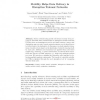Free Online Productivity Tools
i2Speak
i2Symbol
i2OCR
iTex2Img
iWeb2Print
iWeb2Shot
i2Type
iPdf2Split
iPdf2Merge
i2Bopomofo
i2Arabic
i2Style
i2Image
i2PDF
iLatex2Rtf
Sci2ools
125
click to vote
UCS
2007
Springer
2007
Springer
Mobility Helps Data Delivery in Disruption Tolerant Networks
Abstract. Sensor networks using mobile robots have recently been proposed to deal with data communication in disruption tolerant networks (DTNs) where an instantaneous end-to-end path between a source and destination may not exist. In such network scenarios, a node should move to deliver data to the destination. In this paper, we study adaptive formations of mobile robots based on the knowledge of network topology held by each node. Different node formations are applied when nodes have neighboring, clustering, or perfect information of network. Node formations also depend on traffic patterns, e.g., single and multiples packets per event. We introduce a straight line formation called pipeline for delivering multiple packets continuously. The benefit of controlled mobility in DTNs is validated through the ns–2 simulation tool by comparing with the ideal cases.
Related Content
| Added | 09 Jun 2010 |
| Updated | 09 Jun 2010 |
| Type | Conference |
| Year | 2007 |
| Where | UCS |
| Authors | Kaoru Sezaki, Niwat Thepvilojanapong, Yoshito Tobe |
Comments (0)

